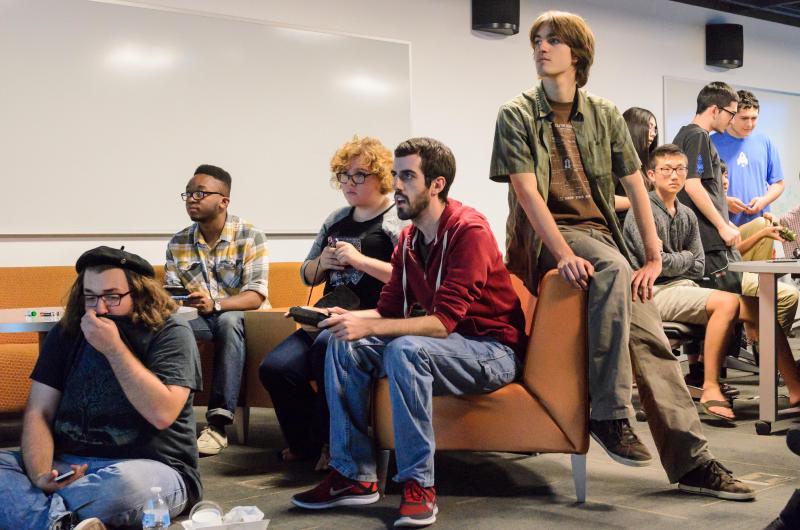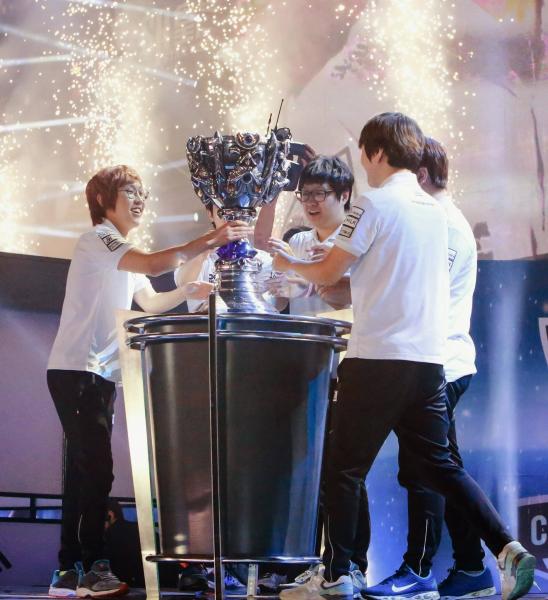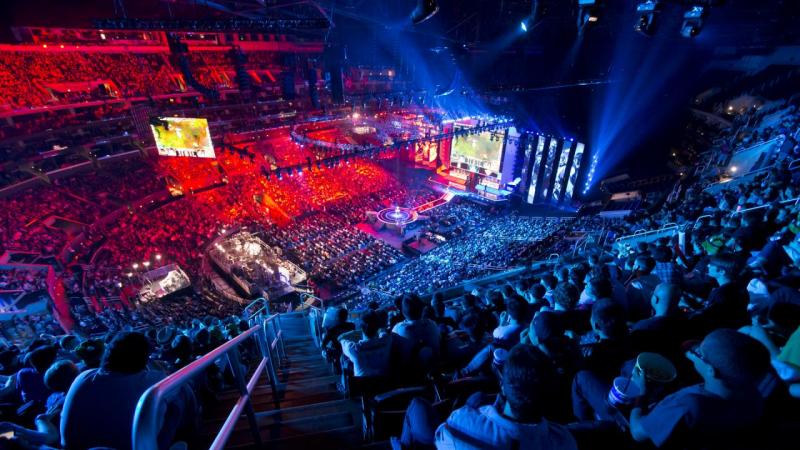League Of Legends And The Rise Of eSports

When League of Legends held its Season Three World Championship in 2013, more than 32 million tuned in to watch two teams of five duke it out, far surpassing the 15.1 million who watched the 2013 NBA Finals. In the end, five Korean players from the team SK Telecom T1 walked away with $1 million prize pool, bragging rights and the Summoner’s Cup, a 70-pound trophy, more than twice the weight of hockey’s Stanley Cup.
What was significant about this tournament was its stature. It didn’t happen in some random basement, as the common stereotype of gamers suggests. It was held at the Staples Center, home of the Los Angeles Lakers, Clippers, Kings and numerous other major sports teams.
While League of Legends has won critical acclaim overseas in countries like South Korea -- where competitive gaming is considered a “national pastime” and couples often head to game clubs for date nights -- the concept of electronic sports, or "e{ports" as it's widely known, has lagged in the United States.
“In America, there’s always been kind of a stigma about gaming, especially people who spend a lot of time on it,” says Cameron Gilbert, a senior at the University of Southern California and a freelance writer for Riot Games, the makers of League of Legends, along with professional gaming teams like Evil Geniuses. "And the idea of watching someone play a game doesn’t really register for a lot of people."
Jeffrey Chau, president of USC's eSports, a group aimed at fostering the gaming community on campus, agreed with the idea that the perceptions of gamers differ internationally. “In Korea, Japan and a certain extent in China, it is more socially acceptable to devote a lot of time and a lot of energy and a lot of resources to become good at a video game. The key understanding is that this isn’t a waste of time."
Here, however, “gaming is seen as fun and frivolous. You’re seen as less of a person than other hardworking people who might be doing other professional stuff like computer science or engineering,” said Chau.
At USC eSports, members can escape from the stigma and hang out with others who share the same passion for games. The club holds weekly meetings on Fridays at one of the Viterbi gaming labs, where students have the opportunity to play a variety of games -- including League of Legends -- and socialize. It's also here that they try new strategies, talk about new developments and just enjoy rounding off the school week.
![USC graduate and former USC eSports member, Sean “Day[9]” Plott at a gaming event. (facebook.com/day9tv) USC graduate and former USC eSports member, Sean “Day[9]” Plott at a gaming event. (facebook.com/day9tv)](../../../sites/default/files/users/user1094/416024_360396490637878_1928723354_o.jpg)
“You watch the League Championship Series the night before and DoubleLift gets a pentakill and want to just go talk to how cool that is with somebody. But if you don’t have friends who watch LCS, you don’t have anyone to be excited with and [USC eSports] helps provide that for people,” says Gilbert.
The club also brings in professional gamers and game developers so members can get an inside look at the eSports world. During major tournaments, like the League of Legends World Championships, Chau and other members help organize viewing parties, where they can get together and watch teams fight for the Summoners Cup.
Some members of the club have even joined the professional gaming scene. Sean “Day[9]” Plott, a School of Cinematic Arts graduate student and former professional Starcraft II player who would enlist other professionals to club meetings, is now one of the most recognizable names in eSports. Forbes also listed Plott in its 30 under 30 list for entertainment for his role in promoting the eSports scene.

Rise to Prominence
So how did League of Legends become the most popular multiplayer game in the world?
Riot Games has invested giant sums of money into promoting the game, and the structure of League of Legends lends itself to having a large audience.
Unlike other games such as Call of Duty and Halo, League of Legends employs a free-to-play model, so anyone can download the game for absolutely no cost. While players earn in-game currency to purchase new champions and other items, they can also choose to spend real cash to accelerate the process.
You also don’t need the latest gaming computer to run League of Legends, as most entry-level computers nowadays should have no problem handling it. “You can play it on a toaster," quipped Gilbert.
League of Legends is also a team-based game, meaning players can invite four of their friends to play along with them. Community is so important to Riot that the company regularly hosts tournaments all over the world. And while they each require an entrance fee, they're actually a money drain.
This is because the company isn’t focused solely on profit; the tournaments are aimed at building fan loyalty and creating an environment that will attract new players.
“They’re building a thing that people will love and stay in for years,” said Devon Meyer, a former community team intern at Riot. The hope is that the longer a player stays, the more likely he or she will make in-game purchases.
These factors have helped the game acquire an impressive 67 million active players a month, and about 27 million a day. During peak hours, more than 7.5 million users are playing at once.
In 2013 alone, the worldwide gaming market took in $93 billion, surpassing that of movies, books and music. Yet the recognition of gamers like Doublelift and game developers like Riot Games is still relatively low compared to that of big-time Hollywood actors and film studios.
Unyielding Criticism
Many have criticized the concept of eSports, saying that games are little more than staring at a computer screen and clicking away with a mouse and a keyboard. It’s not uncommon to see comments calling professional gamers “people with no real career [and] no real experience in anything other than typing and clicking.”
But simplifying the pastime in this way would be the same as calling football just a bunch of men running and throwing a ball to each other, or baseball just hitting a ball with a bat.
In any case, Riot Games doesn't appear to be trying to convert the critics. “Why would you make content to address the opinions of people who don’t like the game when you already have 27 million who love the game?” said Meyer.
In a sense, this passion is a prerequisite for success in the game. Like any sport, defeating an opposing team in League of Legends requires an extensive knowledge of the game, as well as a great deal of strategy. During the game, two teams of five attempt to destroy each other’s bases, called the nexus. Before the match begins, each player selects a "champion" to play, which can range from human characters like Darius, who decimates enemies with a massive axe, to Teemo, a small, mouse-like creature that kills people with exploding mushrooms. There’s even Lux, a mage who can fry enemies with a laser and trap people with the power of light.
Each of the 123 released champions has four unique abilities that range from stunning an enemy with a massive hammer blow to instantly teleporting behind an enemy. That means there’s almost 500 abilities that a professional League player needs to study and understand how to counter if he or she wants to be prepared for any situation.
If this weren’t enough for variety, there are also over 100 items one can purchase with gold acquired during the game. Each of these augments the champion, with buffs like increased attack damage or additional armor against attacks. For example, one could purchase “Rabadon’s Deathcap,” which increases the amount of magic damage a champion can do.
Staying in an engagement even for an additional half-second could mean the difference between winning and losing. Because of this, hand-eye coordination is a must, and pros spend hours practicing the same precise mouse movements and keystroke combinations to the point where they’re nothing more than muscle memories.
“Doing that would seem to us like really minute changes. But the level of precision involved for where you have to click on the screen, timing-wise, muscle memory for when to string together combos for when to string together certain spells and mechanics, that’s some of the physical challenges you have to take into account,” said Chau.

It would be difficult, then, to dismiss such a complex and intense game as little more than child’s play, especially given the immense professional scene with millions of followers around the world. While the perception that gamers are all teenagers with no professional aspirations is a common one here in the U.S., it's largely misguided.
Today, with middle-aged parents and younger kids enjoying games like Candy Crush and Angry Birds, it's almost impossible to define what makes a true gamer. As Gilbert puts it, “If you play games and you want to make that part of your identity, that’s all that matters.”
And as for the skeptics, Jordan Klein, president of the Makers of Entertaining Games Association, suggests that they approach gaming from this viewpoint: “Look at games as art. It’s not just something to waste your time with. It’s something that people spend hours and hours and hours perfecting and fine-tuning, in the same way you would make a movie.”
EDIT: A previous version of this article misidentified Gilbert as a Riot employee. He is actually a freelance writer for Riot Games' League of Legends Esports page.
Reach Staff Reporter/Photographer Benjamin Dunn here. Follow him on Twitter here.



